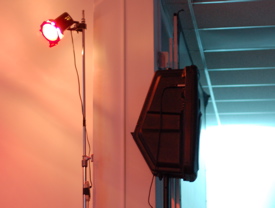Mind the Gap: October 2008 Archives
It's raining something fierce this afternoon, and there is a long list of things I'm supposed to be working on. But my computer seems to be giving me a psychosomatic headache, so I've been procrastinating with a serious intensity.
First, there was the pizza making,

then the furniture assembling,

and then, finally, the pumpkin carving.

I've notice lately that I crave creative activity that results in a material object as opposed to an intellectual product. I suspect this may be a reaction to the average 16-hours-a-day I traditionally seem to spend attached to my laptop.
When I was a kid, I really wanted to become a luthier, but it didn't seem practical and I never pursued it. So is my sudden obsession with crafty projects just a personal thing, or is this a larger 21st-century frustration that many people who work in purely headspace pursuits are confronting? Have you ever suffered from computer dread?
Not sure if the content of my love life is Top 40 hit song material, but for Corey's sake, I certainly hope so.
Get the back story here.
Or skip the fine print and just watch the video.

Last night, during a long and winding conversation about music, genre, emotional vs. intellectual processing and cross-derivatives of the two, etc., we wondered aloud about the ways we use music in our personal lives as opposed to the professional. How can you love this? How can you not? Do you pay more attention to the music or the lyrical content? Oh, really, well that explains it!--You know, that sort of thing.
Later on, we specifically spoke about how we use it to decorate the fantasy space in our heads that houses the lives we live and, perhaps of even greater concern, the lives we aspire to. How important is the music itself, and how important is what we feel the music and its extra-musical trappings say about the type of person we are? It's loosely similar to what reading some particular magazine in public might project. It's a fool who reads a magazine only so strangers will see and think her a certain type of person, but there is a certain type of person who holds it and knows that others, if they glance her way, will know her for what she is inside. It represents her and her values. If that feels adolescent to you, substitute the type of car you drive, clothes you wear, whatever thing or activity you use to define who you are to the world, even if no one is explicitly paying you any attention whatsoever.
Towards the end of the evening, the question we finally got around to was: Why is this the kind of music that you feel most attached to? The "this" varied by respondent, but the answer distilled down neatly. There are lots of people in the world, many you'd share lunch or a drink with a few times a year and have a very grand time. But only a select group, when gathered close around you, feels truly like home.
With that we ate the last of the peanuts in the dish and cashed out.

A holiday handgun promo?!? Because nothing says "I love you, Grandpa" quite like a couple of new clips. Seriously, people, seriously. I know we're all supposed to be getting into the shopping mood early this year for the good of the tanking American economy and all, but this ad (thanks for ruining my breakfast, junk email!!) just makes a person ill.
I was feeling pretty dispirited, and then I got to thinking about an interview I did the other day with Robert Elmes, the director of Galapagos Art Space in New York. He offered the following:
If the arts can't show leadership then who can? We can't be simply bystanders in the midst of what others before us have built. As cultural leaders, we have a deep responsibility to lead not only on culture but on helping society evolve and adapt.
Wars, corruption, Palin, plummeting stock markets, soaring food, gas, and real estate prices, shoddy health insurance. I know a lot of people in the creative class who are feeling completely overwhelmed and trampled down by what's going on in the world. Elmes' words were pretty simple, and at first I thought he sounded pretty naive. Then I realized that I was the one being naive.
In the average America's life, the arts are often pushed into a corner as an "extra", a nice distraction on par with a beach vacation or a $40 bottle of wine. When it's time for the serious issues, art is sent upstairs to play while the adults work it out. It's got me thinking: So much of what Americans think is shaped by the strength of the marketing campaign and the collective image embraced by the participants. Do artists just need to project a different attitude? It sounds ridiculous, but how often do we sell our importance short and, in so doing, project that out to others? Remember that old psych experiment where a class is divided and half become "prisoners" and the rest become "guards"? It's arbitrary, but people fall into the expectations of their assigned roles quite quickly. Have artists done the same? There's so much on the line these days and people are looking for leaders. Isn't it time to step to the front of the pack as a collective force and without apology? Start singing in some food courts for more than laughs. Sounds crazy, but then maybe truly crazy things will happen, resulting in minds opened to new perspectives rather than trapped inside ugly ones.
Mind the Gap has received it's first question! I've offered my 2, now it's your turn.

Dear Mind the Gap,
I really love new music, but a few things about it have me stumped. Non-profit groups like Bang on a Can, Alarm Will Sound, Anti-Social Music, and others celebrate an unprecedented musical diversity. All this suggests an "anything goes" culture--communities without boundaries, etc. My questions: How does an inclusive atmosphere affect the educational status claimed by groups in order to qualify as a not-for-profit? Should pop groups qualify as non-profit organizations, and be eligible for the grants that would accompany this?
Signed,
Non-exclusive in Knoxville
***
Dear Non-Exclusive:
The borders have come tumbling down, you are quite right. Some patrons are quite shocked by what this has brought forth. (For instance, one of Counterstream Radio's listeners wrote in to politely request that we not mix any more of that "jazz music" with the contemporary classical works on the playlist.) In my experience, redrawing the division lines has only been a force for creative and intellectual good. I can't say if the federal government is keeping up with this trend, but I don't expect that they are clinging tightly to any classical-only paradigm when their constituencies of "soccer moms" and "joe six-packs" so clearly have not. But that doesn't mean the PTA is going to go in for taking their classes to bars to hear the local boy band.
In these crazy economic times, of course, everyone is looking closely at what it's going to take to put food on the table, and not-for-profits do have a number of fund-raising and grant-acquiring perks available to them. However, the rules and regulations for getting 501(c)3 status is rendering the process increasingly difficult, and there are big questions you probably want to ask yourself and your group before attempting it. In addition, there are organizational requirements--the establishment of by-laws, a board of directors, and such--that most of the pop groups I know of would not be interested in pursuing. It's just not usually part of the culture or the aspirations of the musicians involved in the scene. (Please correct me if I am off base!!) They want to play gigs and make records, not design education programs for the local elementary school.
That said, I don't think "classical" music is the only genre in town with the ability to promote an educational mission. If that's what you're about, I don't expect that what bin you're filed in is going to be a stumbling block. But has that theory been tested? Anyone out there front a heavy metal band with a mission to teach math to 3rd graders? I mean, how educational is a symphony concert, anyway? Any 501(c)3 pop groups out there want to give it a test run?

Which, if you're going to sit in a basement, is totally how I'd recommend going about it. (They've got enough gear down there for at least three more band members. I was hoping they'd let me stay.)
Matmos (a.k.a. M. C. Schmidt and Drew Daniel) invited me over to their house for a chat about music and, in 2.0 fashion, I brought along a camera and a production crew to document the occasion. We talked about why pop is like junk food, why iTunes is like porn, and why Björk is a star. We also covered how money could kill your music and how making music might make you want to kill the love of your life (and how to best avoid both).
You can watch the video and read the whole transcript here. Like wearing out a mix tape, I've read it four times, and I was there.
Blogroll
AJ Ads
AJ Blogs
AJBlogCentral | rssculture
Terry Teachout on the arts in New York City
Andrew Taylor on the business of arts & culture
rock culture approximately
Laura Collins-Hughes on arts, culture and coverage
Richard Kessler on arts education
Douglas McLennan's blog
Dalouge Smith advocates for the Arts
Art from the American Outback
For immediate release: the arts are marketable
No genre is the new genre
David Jays on theatre and dance
Paul Levy measures the Angles
Judith H. Dobrzynski on Culture
John Rockwell on the arts
Jan Herman - arts, media & culture with 'tude
dance
Apollinaire Scherr talks about dance
Tobi Tobias on dance et al...
jazz
Howard Mandel's freelance Urban Improvisation
Focus on New Orleans. Jazz and Other Sounds
Doug Ramsey on Jazz and other matters...
media
Jeff Weinstein's Cultural Mixology
Martha Bayles on Film...
classical music
Fresh ideas on building arts communities
Greg Sandow performs a book-in-progress
Exploring Orchestras w/ Henry Fogel
Harvey Sachs on music, and various digressions
Bruce Brubaker on all things Piano
Kyle Gann on music after the fact
Greg Sandow on the future of Classical Music
Norman Lebrecht on Shifting Sound Worlds
publishing
Jerome Weeks on Books
Scott McLemee on books, ideas & trash-culture ephemera
theatre
Wendy Rosenfield: covering drama, onstage and off
Chloe Veltman on how culture will save the world
visual
Public Art, Public Space
Regina Hackett takes her Art To Go
John Perreault's art diary
Lee Rosenbaum's Cultural Commentary
Tyler Green's modern & contemporary art blog

